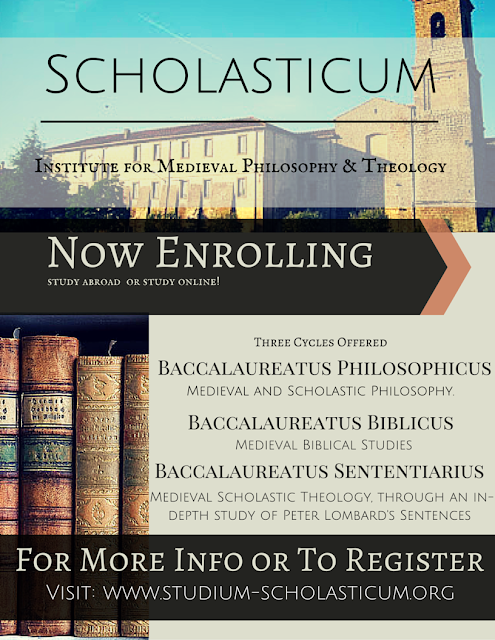Lately, I've been reviewing St Thomas' questions on the sacraments in general (de sacramentis in genere), in Summa theologiae IIIa pars, qq. 60-65. I was simply blown away by the depth of his discussion on the topic of the instrumental causality of the sacraments in q. 62, a. 3.
For St. Thomas, the sacraments are not a mere occasion for God to cause grace, but are God's instrumental cause of grace, and thus relate to God as an instrument to the principal agent. And since the being and action of the instrument is not its own, but that of the principal agent, whereas the principal agent acts in himself, so the power transmitted in a sacrament is God's own power, and hence the sacrament possesses power only transitorily, only as long as God utilizes it as a sacrament/instrument.
Now, there are two types of instruments: conjoined instruments and separate instruments. Conjoined instruments, like the hand, move separate instruments, like a cane. God, the Word, existing from eternity is the principal Agent who confers grace, utilizing both the conjoined instrument of His own sacred humanity and the separate instrument of the sacraments.
Here is the text of Summa theologiae IIIa, q. 62, a. 3 (taken from the Dominican House of Studies Priory page):
Whether Christ as man had the power of producing the inward sacramental effect?
| Respondeo dicendum quod interiorem sacramentorum effectum operatur Christus et secundum quod est Deus, et secundum quod est homo, aliter tamen et aliter. Nam secundum quod est Deus, operatur in sacramentis per auctoritatem. Secundum autem quod est homo, operatur ad interiores effectus sacramentorum meritorie, et efficienter, sed instrumentaliter. Dictum est enim quod passio Christi, quae competit ei secundum humanam naturam, causa est nostrae iustificationis et meritorie, et effective, non quidem per modum principalis agentis, sive per auctoritatem, sed per modum instrumenti, inquantum humanitas est instrumentum divinitatis eius, ut supra dictum est. | I answer that, Christ produces the inward sacramental effect, both as God and as man, but not in the same way. For, as God, He works in the sacraments by authority: but, as man, His operation conduces to the inward sacramental effects meritoriously and efficiently, but instrumentally. For it has been stated (Question [48],Articles [1],6; Question [49], Article [1]) that Christ's Passion which belongs to Him in respect of His human nature, is the cause of justification, both meritoriously and efficiently, not as the principal cause thereof, or by His own authority, but as an instrument, in so far as His humanity is the instrument of His Godhead, as stated above (Question [13], Articles [2],3; Question [19], Article [1]). |
| Sed tamen, quia est instrumentum coniunctum divinitati in persona, habet quandam principalitatem et causalitatem respectu instrumentorum extrinsecorum, qui sunt ministri Ecclesiae et ipsa sacramenta, ut ex supra dictis patet. Et ideo, sicut Christus, inquantum Deus, habet potestatem auctoritatis in sacramentis, ita, inquantum homo, habet potestatem ministerii principalis, sive potestatem excellentiae. Quae quidem consistit in quatuor. Primo quidem, in hoc quod meritum et virtus passionis eius operatur in sacramentis, ut supra dictum est. Et quia virtus passionis copulatur nobis per fidem, secundum illud Rom. III, quem proposuit Deus propitiatorem per fidem in sanguine eius, quam fidem per invocationem nominis Christi protestamur, ideo, secundo, ad potestatem excellentiae quam Christus habet in sacramentis, pertinet quod in eius nomine sacramenta sanctificantur. Et quia ex institutione sacramenta virtutem obtinent, inde est quod, tertio, ad excellentiam potestatis Christi pertinet quod ipse, qui dedit virtutem sacramentis, potuit instituere sacramenta. Et quia causa non dependet ab effectu, sed potius e converso, quarto, ad excellentiam potestatis Christi pertinet quod ipse potuit effectum sacramentorum sine exteriori sacramento conferre. | Nevertheless, since it is an instrument united to the Godhead in unity of Person, it has a certain headship and efficiency in regard to extrinsic instruments, which are the ministers of the Church and the sacraments themselves, as has been explained above (Article [1]). Consequently, just as Christ, as God, has power of "authority" over the sacraments, so, as man, He has the power of ministry in chief, or power of "excellence." And this consists in four things. First in this, that the merit and power of His Passion operates in the sacraments, as stated above (Question [62], Article [5]). And because the power of the Passion is communicated to us by faith, according to Rm. 3:25: "Whom God hath proposed to be a propitiation through faith in His blood," which faith we proclaim by calling on the name of Christ: therefore, secondly, Christ's power of excellence over the sacraments consists in this, that they are sanctified by the invocation of His name. And because the sacraments derive their power from their institution, hence, thirdly, the excellence of Christ's power consists in this, that He, Who gave them their power, could institute the sacraments. And since cause does not depend on effect, but rather conversely, it belongs to the excellence of Christ's power, that He could bestow the sacramental effect without conferring the exterior sacrament. |
A very good and relatively-recent article that goes into some of these themes is Benoît-Dominique de la Soujeole, OP, "The Economy of Salvation: Entitative Sacramentality and Operative Sacramentality," Thomist 75 (2011), 537-53.







.jpg)









